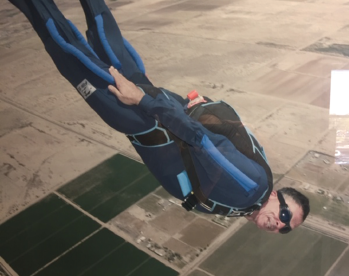
© Courtesy Jeffrey Taffet, MD
On an early morning in 1972, as a junior at Syracuse University, Jeffrey Taffet had no idea that his life was about to change. Arriving home from a party at 6 a.m., he ran into three pre-dental students on their way out—to go skydiving. They asked if he wanted to tag along, he jumped in their car, and thus began a love affair with a sport that lasted more than 30 years.
Explore This Issue
February 2019After he had completed nearly 5,500 jumps and at one time held six world records, his jumping was cut short in 2015 when his canopy exploded on opening, causing three comminuted rib fractures at the juncture to his spine. After back surgery, warnings from his specialist against impact sports took him away from the drop zone for good.
Currently a practicing otolaryngologist at the Phoenix Sinus Center in Arizona, with more than 15,000 sinus, head, and neck procedures under his belt, Dr. Taffet spoke with
ENTtoday about how the art of skydiving has influenced his career in the science of medicine.
ENTtoday: You began your specialization in OB/GYN. What made you change to otolaryngology?
Dr. Taffet: I had already lost the little bit of idealism I had with obstetrics thanks to a horrible call one morning at 2 a.m. But there was also a lot of litigation against obstetricians then—of all the doctors who were sued and had their lives ruined, OBs were probably getting hit the hardest. When you’re in a teaching hospital and everyone that you look up to for your future hates what they’re doing, you have to rethink your career.
So I quit. A doctor in a surgery program gave me a shot, doing general surgery for a couple of years while figuring out what I wanted to do. During my first year there, I got the chance to perform a radical neck dissection case, and I was amazed by the anatomy of the neck. The physician said, “Why don’t you consider otolaryngology? You’ll be a surgeon, and the calls aren’t bad.” I’ve been very happy; it’s been a great profession.
ENTtoday: What kept you skydiving throughout your medical career?
JT: Lots of things tend to keep us away from the dropzone—like life. [There was a time that] my surgical practice was busier than I could have ever imagined. I had two adorable daughters and was getting divorced. During that horrific process, there is that inescapable feeling that someone has glued a neon “failure” sign to your forehead, and its hard to shake. Not only do you loose your house, your stuff, and half of your friends; you lose so much more. You lose a piece of your soul.